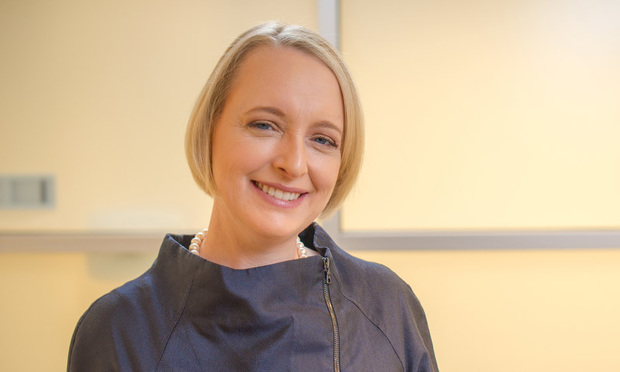Accenture Elevates Former General Counsel to Chief Executive Role
Julie Sweet was hired in 2010 as general counsel at the global consulting firm and promoted to chief executive for North America five years later.
July 12, 2019 at 03:05 PM
3 minute read
 Julie Sweet, Accenture
Julie Sweet, Accenture
In 2015, Julie Sweet left her role as general counsel at Accenture to put her business judgment to use as the global consulting firm's chief executive for North America. More than four years later, that move paid off: On Thursday, Sweet was named Accenture's new chief executive.
The move comes on the heels of a shake-up within Accenture's legal department and highlights the growing trend of companies elevating their attorneys to nonlegal positions to make business decisions.
Sweet, 51, succeeds David Rowland, who had been serving as interim chief executive since January, when then-Accenture CEO Pierre Nanterme died of colon cancer. Her appointment is effective Sept. 1, according to a company statement announcing her promotion.
Before joining Accenture, Sweet, who speaks Mandarin, was a partner for 10 years in the corporate law firm of Cravath, Swaine & Moore, where she worked in both New York and China, on the mainland and in Hong Kong. Through a company spokesperson, she declined to comment on her new position.
“Julie is the right person to lead Accenture into the future, given her strong command of our business and proven ability to drive results in our largest market,” Rowland, who, effective Sept. 1, will serve as executive chairman, said in the news release. “We are on a positive growth trajectory at Accenture and are very well-positioned to continue building on our strong momentum.”
Last month, Accenture announced that Chad Jerdee, who replaced Sweet as GC and chief compliance officer when she took the North American operations business position in 2015, will take on a new role overseeing Accenture's global strategy and programs focused on responsible business, corporate sustainability and citizenship.
Jerdee's deputy GC Joel Unruch will replace Jerdee, becoming Accenture's GC and chief compliance officer, effective in September.
Jerdee's promotion, as well as Sweet's four-plus years ago, represents the increasing trend of high-ranking in-house lawyers' moves to executive decision-making roles within their companies.
In March, for example, Wells Fargo's general counsel, C. Allen Parker, was named interim CEO. At the time, the board of directors indicated he would not be in the running to become the permanent CEO.
More recently, in May, Carlos Hernandez was made interim CEO of Fluor Corp. and later the permanent CEO, and Stanley Pierre-Louis was named the permanent CEO of the Electronic Software Association.
Last month, Matthew Sorrentino, the senior vice president and chief legal officer at Lehigh Valley Health Network, was named acting CEO while the organization looks for a permanent replacement. And in a newly created role, Aleksandra Miziolek, then GC at Novi, Michigan-based automotive systems and components company Cooper Standard, was promoted to chief transformation officer responsible for directing transformation initiatives for long-term growth.
In addition, 81% of the 200 senior corporate counsel in the U.S., Asia and Europe who participated in The GC {Re}defined study released in April by ALM's Global Leaders in Law and Morrison & Foerster believed it was fundamental for them to have a seat at the C-suite table. And nearly 40% of GCs believed their next career move would be stepping up to serve as CEO.
This content has been archived. It is available through our partners, LexisNexis® and Bloomberg Law.
To view this content, please continue to their sites.
Not a Lexis Subscriber?
Subscribe Now
Not a Bloomberg Law Subscriber?
Subscribe Now
NOT FOR REPRINT
© 2025 ALM Global, LLC, All Rights Reserved. Request academic re-use from www.copyright.com. All other uses, submit a request to [email protected]. For more information visit Asset & Logo Licensing.
You Might Like
View All
Chasing Goals Won't Give Frazzled In-House Lawyers Inner Peace, But a 'Mental Cleanse' Might

With 'Fractional' C-Suite Advisers, Midsize Firms Balance Expertise With Expense
4 minute read
Some Clients Are Pushing for Transparency Surrounding Origination Credits
5 minute read
The AI Revolution Is Here. Who Will Be the Winners and Losers in Legal Services?
10 minute readTrending Stories
Who Got The Work
J. Brugh Lower of Gibbons has entered an appearance for industrial equipment supplier Devco Corporation in a pending trademark infringement lawsuit. The suit, accusing the defendant of selling knock-off Graco products, was filed Dec. 18 in New Jersey District Court by Rivkin Radler on behalf of Graco Inc. and Graco Minnesota. The case, assigned to U.S. District Judge Zahid N. Quraishi, is 3:24-cv-11294, Graco Inc. et al v. Devco Corporation.
Who Got The Work
Rebecca Maller-Stein and Kent A. Yalowitz of Arnold & Porter Kaye Scholer have entered their appearances for Hanaco Venture Capital and its executives, Lior Prosor and David Frankel, in a pending securities lawsuit. The action, filed on Dec. 24 in New York Southern District Court by Zell, Aron & Co. on behalf of Goldeneye Advisors, accuses the defendants of negligently and fraudulently managing the plaintiff's $1 million investment. The case, assigned to U.S. District Judge Vernon S. Broderick, is 1:24-cv-09918, Goldeneye Advisors, LLC v. Hanaco Venture Capital, Ltd. et al.
Who Got The Work
Attorneys from A&O Shearman has stepped in as defense counsel for Toronto-Dominion Bank and other defendants in a pending securities class action. The suit, filed Dec. 11 in New York Southern District Court by Bleichmar Fonti & Auld, accuses the defendants of concealing the bank's 'pervasive' deficiencies in regards to its compliance with the Bank Secrecy Act and the quality of its anti-money laundering controls. The case, assigned to U.S. District Judge Arun Subramanian, is 1:24-cv-09445, Gonzalez v. The Toronto-Dominion Bank et al.
Who Got The Work
Crown Castle International, a Pennsylvania company providing shared communications infrastructure, has turned to Luke D. Wolf of Gordon Rees Scully Mansukhani to fend off a pending breach-of-contract lawsuit. The court action, filed Nov. 25 in Michigan Eastern District Court by Hooper Hathaway PC on behalf of The Town Residences LLC, accuses Crown Castle of failing to transfer approximately $30,000 in utility payments from T-Mobile in breach of a roof-top lease and assignment agreement. The case, assigned to U.S. District Judge Susan K. Declercq, is 2:24-cv-13131, The Town Residences LLC v. T-Mobile US, Inc. et al.
Who Got The Work
Wilfred P. Coronato and Daniel M. Schwartz of McCarter & English have stepped in as defense counsel to Electrolux Home Products Inc. in a pending product liability lawsuit. The court action, filed Nov. 26 in New York Eastern District Court by Poulos Lopiccolo PC and Nagel Rice LLP on behalf of David Stern, alleges that the defendant's refrigerators’ drawers and shelving repeatedly break and fall apart within months after purchase. The case, assigned to U.S. District Judge Joan M. Azrack, is 2:24-cv-08204, Stern v. Electrolux Home Products, Inc.
Featured Firms
Law Offices of Gary Martin Hays & Associates, P.C.
(470) 294-1674
Law Offices of Mark E. Salomone
(857) 444-6468
Smith & Hassler
(713) 739-1250






